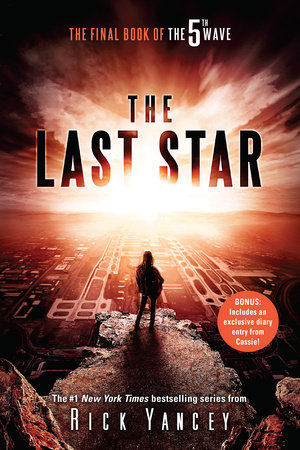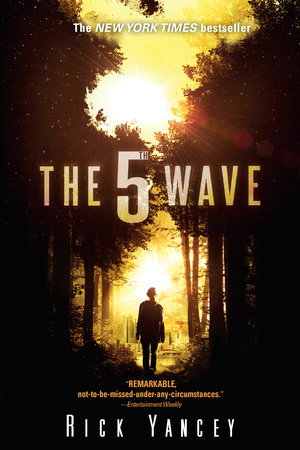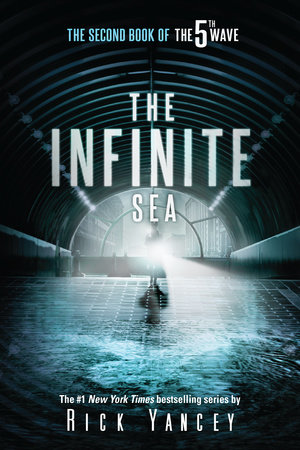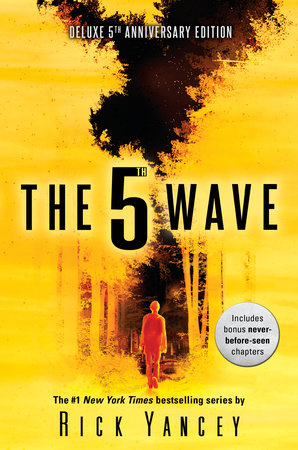
The 5th Wave
Part of: The 5th Wave
Ebook
$8.99
- Pages: 480 Pages
- Series: The 5th Wave
- Publisher: Penguin Young Readers Group
- Imprint: G.P. Putnam's Sons Books for Young Readers
- ISBN: 9781101598962
An Excerpt From
The 5th Wave
ALIENS ARE STUPID.
I’m not talking about real aliens. The Others aren’t stupid. The Others are so far ahead of us, it’s like comparing the dumbest human to the smartest dog. No contest.
No, I’m talking about the aliens inside our own heads.
The ones we made up, the ones we’ve been making up since we realized those glittering lights in the sky were suns like ours and probably had planets like ours spinning around them. You know, the aliens we imagine, the kind of aliens we’d like to attack us, human aliens. You’ve seen them a million times. They swoop down from the sky in their flying saucers to level New York and Tokyo and London, or they march across the countryside in huge machines that look like mechanical spiders, ray guns blasting away, and always, always, humanity sets aside its differences and bands together to defeat the alien horde. David slays Goliath, and everybody (except Goliath) goes home happy.
What crap.
It’s like a cockroach working up a plan to defeat the shoe on its way down to crush it.
There’s no way to know for sure, but I bet the Others knew about the human aliens we’d imagined. And I bet they thought it was funny as hell. They must have laughed their asses off. If they have a sense of humor . . . or asses. They must have laughed the way we laugh when a dog does something totally cute and dorky.
Oh, those cute, dorky humans! They think we think like they do! Isn’t that adorable?
Forget about flying saucers and little green men and giant mechanical spiders spitting out death rays. Forget about epic battles with tanks and fighter jets and the final victory of us scrappy, unbroken, intrepid humans over the bug-eyed swarm. That’s about as far from the truth as their dying planet was from our living one.
The truth is, once they found us, we were toast.
2
SOMETIMES I THINK I might be the last human on Earth.
Which means I’m the last human in the universe.
I know that’s dumb. They can’t have killed everyone . . . yet. I see how it could happen, though, eventually. And then I think that’s exactly what the Others want me to see.
Remember the dinosaurs? Well.
So I’m probably not the last human on Earth, but I’m one of the last. Totally alone—and likely to stay that way—until the 4th Wave rolls over me and carries me down.
That’s one of my night thoughts. You know, the three-in-the-morning, oh-my-God-I’m-screwed thoughts. When I curl into a little ball, so scared I can’t close my eyes, drowning in fear so intense I have to remind myself to breathe, will my heart to keep beating. When my brain checks out and begins to skip like a scratched CD. Alone, alone, alone, Cassie, you’re alone.
That’s my name. Cassie.
Not Cassie for Cassandra. Or Cassie for Cassidy. Cassie for Cassiopeia, the constellation, the queen tied to her chair in the northern sky, who was beautiful but vain, placed in the heavens by the sea god Poseidon as a punishment for her boasting. In Greek, her name means “she whose words excel.”
My parents didn’t know the first thing about that myth. They just thought the name was pretty.
Even when there were people around to call me anything, no one ever called me Cassiopeia. Just my father, and only when he was teasing me, and always in a very bad Italian accent: Cass-ee-oh-PEE-a. It drove me crazy. I didn’t think he was funny or cute, and it made me hate my own name. “I’m Cassie!” I’d holler at him. “Just Cassie!” Now I’d give anything to hear him say it just one more time.
When I was turning twelve—four years before the Arrival—my father gave me a telescope for my birthday. On a crisp, clear fall evening, he set it up in the backyard and showed me the constellation.
“See how it looks like a W?” he asked.
“Why did they name it Cassiopeia if it’s shaped like a W?” I replied. “W for what?”
“Well . . . I don’t know that it’s for anything,” he answered with a smile. Mom always told him it was his best feature, so he trotted it out a lot, especially after he started going bald. You know, to drag the other person’s eyes downward. “So, it’s for anything you like! How about wonderful? Or winsome? Or wise?” He dropped his hand on my shoulder as I squinted through the lens at the five stars burning over fifty light-years from the spot on which we stood. I could feel my father’s breath against my cheek, warm and moist in the cool, dry autumn air. His breath so close, the stars of Cassiopeia so very far away.
The stars seem a lot closer now. Closer than the three hundred trillion miles that separate us. Close enough to touch, for me to touch them, for them to touch me. They’re as close to me as his breath had been.
That sounds crazy. Am I crazy? Have I lost my mind? You can only call someone crazy if there’s someone else who’s normal. Like good and evil. If everything was good, then nothing would be good.
Whoa. That sounds, well . . . crazy.
Crazy: the new normal.
I guess I could call myself crazy, since there is one other person I can compare myself to: me. Not the me I am now, shivering in a tent deep in the woods, too afraid to even poke her head from the sleeping bag. Not this Cassie. No, I’m talking about the Cassie I was before the Arrival, before the Others parked their alien butts in high orbit. The twelve-year-old me, whose biggest problems were the spray of tiny freckles on her nose and the curly hair she couldn’t do anything with and the cute boy who saw her every day and had no clue she existed. The Cassie who was coming to terms with the painful fact that she was just okay. Okay in looks. Okay in school. Okay at sports like karate and soccer. Basically the only unique things about her were the weird name—Cassie for Cassiopeia, which nobody knew about, anyway—and her ability to touch her nose with the tip of her tongue, a skill that quickly lost its impressiveness by the time she hit middle school.
I’m probably crazy by that Cassie’s standards.
And she sure is crazy by mine. I scream at her sometimes, that twelve-year-old Cassie, moping over her hair or her weird name or at being just okay. “What are you doing?” I yell. “Don’t you know what’s coming?”
But that isn’t fair. The fact is she didn’t know, had no way of knowing, and that was her blessing and why I miss her so much, more than anyone, if I’m being honest. When I cry—when I let myself cry—that’s who I cry for. I don’t cry for myself. I cry for the Cassie that’s gone.
And I wonder what that Cassie would think of me.
The Cassie who kills.
3
HE COULDN’T HAVE BEEN much older than me. Eighteen. Maybe nineteen. But hell, he could have been seven hundred and nineteen for all I know. Five months into it and I’m still not sure if the 4th Wave is human or some kind of hybrid or even the Others themselves, though I don’t like to think that the Others look just like us and talk just like us and bleed just like us. I like to think of the Others as being . . . well, other.
I was on my weekly foray for water. There’s a stream not far from my campsite, but I’m worried it might be contaminated, either from chemicals or sewage or maybe a body or two upstream. Or poisoned. Depriving us of clean water would be an excellent way to wipe us out quickly.
So once a week I shoulder my trusty M16 and hike out of the forest to the interstate. Two miles south, just off Exit 175, there’re a couple of gas stations with convenience stores attached. I load up as much bottled water as I can carry, which isn’t a lot because water is heavy, and get back to the highway and the relative safety of the trees as quickly as I can, before night falls completely. Dusk is the best time to travel. I’ve never seen a drone at dusk. Three or four during the day and a lot more at night, but never at dusk.
From the moment I slipped through the gas station’s shattered front door, I knew something was different. I didn’t see anything different—the store looked exactly like it had a week earlier, the same graffiti-scrawled walls, overturned shelves, floor strewn with empty boxes and caked-in rat feces, the busted-open cash registers and looted beer coolers. It was the same disgusting, stinking mess I’d waded through every week for the past month to get to the storage area behind the refrigerated display cases. Why people grabbed the beer and soda, the cash from the registers and safe, the rolls of lottery tickets, but left the two pallets of drinking water was beyond me. What were they thinking? It’s an alien apocalypse! Quick, grab the beer!
The same disaster of spoilage, the same stench of rats and rotted food, the same fitful swirl of dust in the murky light pushing through the smudged windows, every out-of-place thing in its place, undisturbed.
Still.
Something was different.
I was standing in the little pool of broken glass just inside the doorway. I didn’t see it. I didn’t hear it. I didn’t smell or feel it. But I knew it.
Something was different.
It’s been a long time since humans were prey animals. A hundred thousand years or so. But buried deep in our genes the memory remains: the awareness of the gazelle, the instinct of the antelope. The wind whispers through the grass. A shadow flits between the trees. And up speaks the little voice that goes, Shhhh, it’s close now. Close.
I don’t remember swinging the M16 from my shoulder. One minute it was hanging behind my back, the next it was in my hands, muzzle down, safety off.
Close.
I’d never fired it at anything bigger than a rabbit, and that was a kind of experiment, to see if I could actually use the thing without blowing off one of my own body parts. Once I shot over the heads of a pack of feral dogs that had gotten a little too interested in my campsite. Another time nearly straight up, sighting the tiny, glowering speck of greenish light that was their mothership sliding silently across the backdrop of the Milky Way. Okay, I admit that was stupid. I might as well have erected a billboard with a big arrow pointing at my head and the words yoo-hoo, here i am!
After the rabbit experiment—it blew that poor damn bunny apart, turning Peter into this unrecognizable mass of shredded guts and bone—I gave up the idea of using the rifle to hunt. I didn’t even do target practice. In the silence that had slammed down after the 4th Wave struck, the report of the rounds sounded louder than an atomic blast.
Still, I considered the M16 my bestest of besties. Always by my side, even at night, burrowed into my sleeping bag with me, faithful and true. In the 4th Wave, you can’t trust that people are still people. But you can trust that your gun is still your gun.
Shhh, Cassie. It’s close.
Close.
I should have bailed. That little voice had my back. That little voice is older than I am. It’s older than the oldest person who ever lived.
I should have listened to that voice.
Instead, I listened to the silence of the abandoned store, listened hard. Something was close. I took a tiny step away from the door, and the broken glass crunched ever so softly under my foot.
And then the Something made a noise, somewhere between a cough and a moan. It came from the back room, behind the coolers, where my water was.
That’s the moment when I didn’t need a little old voice to tell me what to do. It was obvious, a no-brainer. Run.
But I didn’t run.
The first rule of surviving the 4th Wave is don’t trust anyone. It doesn’t matter what they look like. The Others are very smart about that—okay, they’re smart about everything. It doesn’t matter if they look the right way and say the right things and act exactly like you expect them to act. Didn’t my father’s death prove that? Even if the stranger is a little old lady sweeter than your great-aunt Tilly, hugging a helpless kitten, you can’t know for certain—you can never know—that she isn’t one of them, and that there isn’t a loaded .45 behind that kitten.
It isn’t unthinkable. And the more you think about it, the more thinkable it becomes. Little old lady has to go.
That’s the hard part, the part that, if I thought about it too much, would make me crawl into my sleeping bag, zip myself up, and die of slow starvation. If you can’t trust anyone, then you can trust no one. Better to take the chance that Aunty Tilly is one of them than play the odds that you’ve stumbled across a fellow survivor.
That’s friggin’ diabolical.
It tears us apart. It makes us that much easier to hunt down and eradicate. The 4th Wave forces us into solitude, where there’s no strength in numbers, where we slowly go crazy from the isolation and fear and terrible anticipation of the inevitable.
So I didn’t run. I couldn’t. Whether it was one of them or an Aunt Tilly, I had to defend my turf. The only way to stay alive is to stay alone. That’s rule number two.
I followed the sobbing coughs or coughing sobs or whatever you want to call them till I reached the door that opened to the back room. Hardly breathing, on the balls of my feet.
The door was ajar, the space just wide enough for me to slip through sideways. A metal rack on the wall directly in front of me and, to the right, the long narrow hallway that ran the length of the coolers. There were no windows back here. The only light was the sickly orange of the dying day behind me, still bright enough to hurl my shadow onto the sticky floor. I crouched down; my shadow crouched with me.
I couldn’t see around the edge of the cooler into the hall. But I could hear whoever—or whatever—it was at the far end, coughing, moaning, and that gurgling sob.
Either hurt badly or acting hurt badly, I thought. Either needs help or it’s a trap.
This is what life on Earth has become since the Arrival. It’s an either/or world.
Either it’s one of them and it knows you’re here or it’s not one of them and he needs your help.
Either way, I had to get up and turn that corner.
So I got up.
And I turned the corner.
More in Series











